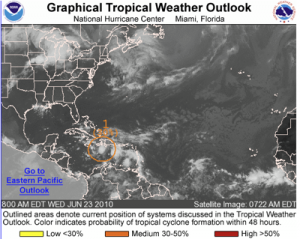Morale in the Gulf Coast
Residents of Louisiana must be on pins and needles as their fate is decided. A judge overturned the moratorium on offshore drilling imposed by the federal government, which government action caused additional hardship for the state, as it depends on the jobs and taxes generated by the oil industry. And the rest of the country would share the pain, as recent research by the energy analysts of Goldman Sachs found that a ban on offshore drilling would reduce expected oil production by one-half by 2015. As long as we depend on fossil fuels to meet our energy needs, a complete ban appears shortsighted. Even worse, according to the State Department, the administration declined offers put forward by 30 countries and international organizations to assist in containing and cleaning the oil spill.
The White House indicated that it plans to appeal the ruling. A news report that the judge who overturned the moratorium may have undisclosed financial ties to the oil industry likely strengthens the government’s position. And just when you think that the news cannot be worse for the Gulf Coast, the National Oceanic and Atmospheric Administration reports a 30% likelihood that a tropical wave coming from Haiti may develop into a serious cyclone. A hurricane would only worsen the environmental crisis, as high winds and storm swells could spread the contaminants.
But for the fishing and tourism industries, the storm has already hit. CNN reports that P&J Oyster Company, a business in the heart of New Orleans’ French Quarter that has been operating for 134 years, was forced to close. A study published by Texas A&M University Press reports that the four largest industries in the Gulf of Mexico, accounting for $230 billion in economic activity annually, are oil, tourism, fishing and shipping. It may be years, according to the report, if not decades, before these industries fully recover. No wonder USA Today reports of the importance of keeping up morale in the region; recovery will be a long and tough process.
